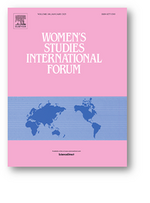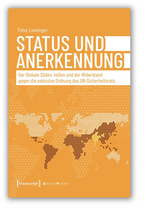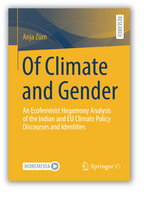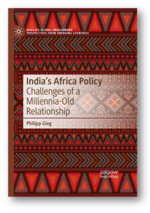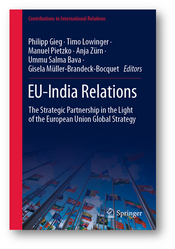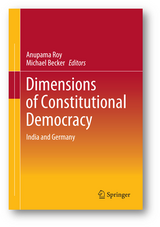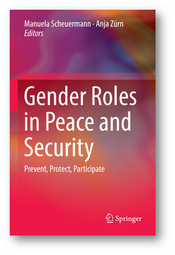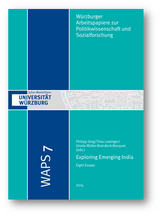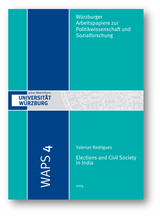Publications
Here you'll find publications that have been published in the framework of the IPS India Forum, either by its members or by guest professors who have been visiting our Institute.
Special Issues
Special Issue – (Re)Writing Global Gender Norms: The Role of Southern Actors
Soumita Basu / Philipp Gieg / Peace A. Medie (eds.)
Women's Studies International Forum, Volume 108, 102999
Published in 2025
Global gender norms are negotiated and written in international arenas, with the participation of state and non-state actors. However, these norms are often associated with intellectual traditions, historical and cultural processes, and policy interests of the Global North; practices and histories from the Global South are often side-lined. The Special Issue presents evidence-based critique of such power asymmetries, and demonstrates how Global South actors have informed globally negotiated gender norms. Contributions on/from Africa, Asia and Latin America spotlight insights for realizing progressive and more effective norms, that emerge from the contestations between the local and the global. The focus is not only on ‘vertical’ intersections, but also ‘horizontal’ ones whereby transformative gender politics in one part of the world can inspire efforts of the marginalized elsewhere.
Monographs
Status und Anerkennung: Der Globale Süden, Indien und der Widerstand gegen die exklusive Ordnung des UN-Sicherheitsrats
Timo Lowinger
Published in 2025
transcript, Bielefeld
Language: German
434 pages
ISBN: 978-3-8376-7876-5
German abstract: Wie kämpfen Staaten des Globalen Südens um Anerkennung in einer exklusiven, westlich geprägten Weltordnung? Ausgehend von der Kritischen Theorie der Anerkennung entwickelt Timo Lowinger ein neues Statusmodell globaler Anerkennung, das den Widerstand des Globalen Südens theoretisch wie empirisch fassbar macht. Dabei stellt er als Beispiel für den Ruf nach Gerechtigkeit und einer inklusiveren Weltpolitik Indiens Kampf um einen ständigen Sitz im UN-Sicherheitsrat ins Zentrum seiner Analyse, was besonders vor dem Hintergrund einer zunehmend hindunationalistisch geprägten Außenpolitik von besonderer Relevanz ist – eine kritische Perspektive für alle, die globale Machtstrukturen verstehen und kritisch hinterfragen wollen.
Of Climate and Gender: An Ecofeminist Hegemony Analysis of the Indian and EU Climate Policy Discourses and Identities
Anja Zürn
Published in 2024
Springer VS, Wiesbaden
Language: Englisch
405 pages
DOI: 10.1007/978-3-658-46774-6
ISBN: 978-3-658-46773-9
ISBN eBook: 978-3-658-46774-6
What significance do gendered discourse structures have for the state identity of India and the EU when it comes to their respective climate policies? This question is the focus of the study, which offers a comprehensive analysis of the climate discourse of the emerging power India and the EU, often described as a leader of climate change governance. Following the assumption that, although a wide variety of solutions to the greatest challenge of our time – the climate crisis – have been formulated, politicians of various states and regional organisations opt almost exclusively for technological responses, this study explores one possible cause: firmly anchored gender structures within both the Indian and EU climate discourses. Anja Zürn employs the ecofeminist hegemony analysis she developed for this study, first reconstructing the climate policy identities of India and the EU, and then subjecting them to an ecofeminist critique.
India's Africa Policy – Challenges of a Millennia-Old Relationship
Philipp Gieg
Published in 2023
Palgrave Macmillan, Singapur
413 pages
Language: English
DOI: 10.1007/978-981-19-6849-5
ISBN Hardcover: 978-981-19-6848-8
ISBN eBook: 978-981-19-6849-52
The book analyses how India’s rise to the status of an emerging power has affected New Delhi’s Africa policy, after sketching the historical evolution and normative underpinnings of Indo-African relations, and what challenges it has brought for New Delhi’s engagement with the continent. India and Africa share a history dating back millennia. Today, India is one of Africa’s biggest trading partner countries, second only to China. The country regularly extends lines of credit worth billions to African nations, and its pharmaceutical producers dominate many African markets; almost one-fifth of India’s oil imports and more than one-quarter of its natural gas imports come from the continent. However, relations between India and Africa are far from being limited to economic cooperation. The book scrutinises three foreign policy fields: (1) India’s foreign economic policy towards Africa with an in-depth analysis of Indo-African trade, investment and lines of credit; (2) New Delhi’s development cooperation policy vis-à-vis Africa, its principles, instruments and volume; (3) India’s politico-diplomatic foreign and security policy vis-à-vis Africa, including New Delhi's high-level diplomacy, security and diaspora policy as well as multilateral Africa policy.
Edited Volumes
EU-India Relations – The Strategic Partnership in the Light of the European Union Global Strategy
Philipp Gieg / Timo Lowinger / Manuel Pietzko / Anja Zürn / Ummu Salma Bava / Gisela Müller-Brandeck-Bocquet (eds.)
Published in 2021
Springer, Cham
Language: English
DOI: 10.1007/978-3-030-65044-5
ISBN: 978-3-030-65044-5
India and the European Union bear a particular responsibility: as international relations change, not least because of the global COVID-19 pandemic, the two largest democracies in the world have the unique potential to jointly demonstrate that trusting cooperation and mutual understanding are both indispensable and fruitful—all the more so in the context of increasing national egoism and disregard for the fundamental principles of multilateralism. This realisation is not new. Believing in the necessity and mutual benefit of close cooperation, India and the EU struck a strategic partnership in 2004. But resounding success in forging closer bilateral ties and promoting an inclusive, rules-based global order has proved elusive. Since 2016, however, the EU’s Global Strategy has offered new opportunities for a restart of European foreign policy, envisaging new partnerships and recalibrating existing ones. On India’s part, too, changing stances have presented new openings—with New Delhi criticising protectionism and calling for a strengthening of multilateralism. This timely book scrutinises the status quo and the future potential of revitalised EU-India relations. By exploring and analysing conceptual approaches to and key dimensions of the strategic partnership, including trade, climate policy and development cooperation, it evaluates the prospects for future cooperation. Lastly, it offers policy recommendations for advancing the partnership between India and the EU.
Dimensions of Constitutional Democracy. India and Germany
Anupama Roy / Michael Becker (eds.)
Published in 2020
Springer, Cham
Language: English
DOI: 10.1007/978-981-15-3899-5
This book examines a selection of themes that have become salient in contemporary debates on constitutional democracies. It focuses in particular on the experiences of India and Germany as examples of post-war and post-colonial constitutional democracies whose trajectories illustrate democratic transitions and transformative constitutionalism. While transformative constitutionalism has come to be associated specifically with the post-apartheid experience in South Africa, this book uses the transformative as an analytical framework to transcend the dichotomy of west and east and explore how temporally coincident constitutions have sought to install constitutional democracies by breaking with the past. While the constitution-making processes in the two countries were specific to their political contexts, the constitutional promises and futures converged. In this context, the book explores the themes of Constitutionalism, Nationalism, Secularism, Sovereignty and Rule of Law, Freedoms and Rights, to investigate how the contestations over democratic transitions and democratic futures have unfolded in the two democracies. It offers readers valuable insights into how the normative frameworks of constitutional democracy take concrete form at specific sites of democratic and constitutional imagination in Dalit and Islamic writings, as well as the relationship between state and religion in the writings of public intellectuals, political and legal philosophers. The book also focuses on specific sites of contestation in democracies including the relationship between sovereignty and citizenship in post-colonial India, free speech and sedition in liberal democracies, questions of land rights in connection with economic and political changes in contemporary contexts, and the rights of indigenous communities with regard to international conventions and domestic law. Given its scope, it will be of interest to students and scholars of political theory, political philosophy, comparative constitutionalism, law and human rights.
Gender Roles in Peace and Security: Prevent, Protect, Participate
Manuela Scheuermann / Anja Zürn (eds.)
Published in 2019
Springer, Cham
Language: English
DOI: 10.1007/978-3-030-21890-4
This volume examines the specific gender roles in peace and security. The authors analyse the implementation process of United Nations Security Council Resolution 1325 in various countries and discuss systemic challenges concerning the Women, Peace and Security agenda. Through in-depth case studies, the authors shed new light on topics such as the gender-related mechanisms of peace processes, gender training practices for police personnel, and the importance of violence prevention. The volume studies the role of women in peace and security as well as questions of gender mainstreaming by adopting various theoretical concepts, including feminist theories, concepts of masculinity, organizational and security studies. It also highlights regional and transnational approaches for the implementation of the Women, Peace and Security agenda, namely the perspectives of the European Union, NATO, the UN bureaucracy and the civil society. It presents best cases and political advice for tackling the problem of gender inequality in peace and security. This publication in the framework of TM5 "The Challenge of Gender" of the M.S. Merian – R. Tagore International Centre of Advanced Studies ‘Metamorphoses of the Political’ (ICAS:MP) has been financially supported by the Federal Ministry of Education and Research (BMBF).
Journal Articles and Chapters in Edited Volumes (selected)
- Gieg, Philipp / Müller-Brandeck-Bocquet, Gisela:
Navigating Norms and Pragmatism in EU-India Relations: Multilateralism, Connectivity, and the Future of the Strategic Partnership
In: Jopp, Mathias / Pollak, Johannes (eds.) (2025): The European Union’s Geopolitics. The Lackluster World Power, Cham: Springer., pp. 263-292.
DOI: 10.1007/978-3-031-74587-4_13
- Gieg, Philipp:
Indien und seine Entwicklungszusammenarbeit
Language: German; translated title: India and its Development Cooperation
In: Müller, Markus Hans-Peter (Hrsg.) (2024): India in the 21st Century – On its way to a post-industrial economy, Wiesbaden: Springer Gabler, pp. 205-224.
DOI: 10.1007/978-3-658-43014-6_12
- Gieg, Philipp:
Indien als sicherheitspolitischer Akteur im westlichen Indischen Ozean: Ein Kooperationspartner mit Potenzial für die Europäische Union?
Language: German; translated title: India as a Security Policy Actor in the Western Indian Ocean: A Cooperation Partner with Potential for the European Union?
In: Gieg, Philipp / Lowinger, Timo / Pietzko, Manuel / Rüger, Carolin / Scheuermann, Manuela / Zürn, Anja (eds.) (2023): Jenseits der Krisen: Potenziale der europäischen Integration im 21. Jahrhundert, Wiesbaden: SpringerVS, pp. 115-149.
DOI: 10.1007/978-3-658-41608-9_5
- Lowinger, Timo:
The India that can’t say yes? Weltinnenpolitik und die theorieimmanente Exklusion des Globalen Südens
In: S+F Sicherheit und Frieden, 37:4 (2019), pp. 202-207.
DOI: 10.5771/0175-274X-2019-4-203
- Gieg, Philipp:
Same Same but Different? India–Africa Relations and Chinese Involvement in the Continent
In: Insight on Africa 8:1 (2016), pp. 40-58.
DOI: 10.1177/0975087815612291
-
Gsänger, Matthias:
„We are not going just to copy“: Der indische Demokratiediskurs von den 1920er Jahren bis zur Verfassunggebenden Versammlung
In: Sophia Schubert, Alexander Weiß (eds.): "Demokratie" jenseits des Westens, PVS Special Issue / Sonderhaft 2016, pp. 511-534.
DOI: 10.5771/9783845261904-512 - Gieg, Philipp:
Modi-fying India-Africa Relations? The New Government’s Africa Policy and the 3rd India-Africa Forum Summit
In: FPRC Journal 24: India-South Africa Relations, Issue 4/2015, pp. 49-57.
Würzburg Working Papers in Political Science and Sociology
Exploring Emerging India – Eight Essays
Philipp Gieg / Timo Lowinger / Gisela Müller-Brandeck-Bocquet (eds.)
WAPS 7
Published: 12 October 2015
Language: English
DOI: 10.25972/OPUS-11997
India's economic rise since the 1990s has been followed by a more prominent global role for the country. Despite economic setbacks in recent years and huge domestic challenges like poverty, caste issues, and gender inequality, India today is almost universally characterised as an “emerging power”. At the same time, the country continues to show an enormous diversity. Thus, exploring emerging India can surely not be confined to economic analysis only. Instead, it is vital to take current developments in domestic and international politics, society, culture, religion, and political thinking into consideration as well.
Following an interdisciplinary approach, contributions from Political Science, International Relations, Indology, Political Theory, and Economics are fundamental in order to grasp the country's diversity. This collection assembles eight essays which, individually, serve as working papers reflecting the authors' various research focuses, while collectively composing a multifaceted and multidis-ciplinary picture of emerging India. It thereby reflects the approach the University of Würzburg’s Centre for Modern India and the Institute for Political Science and Sociology’s India Forum are committed to: bringing together different academic disciplines in order to generate nuanced insights into India’s manifold diversity.
Elections and Civil Society in India
Valerian Rodrigues
WAPS 4
Published: 30 October 2014
Language: English
DOI: 10.25972/OPUS-10500
The analysis of the 2014 elections to Lok Sabha in India describes the results and their enormous extent with a differentiate regard to social group voting. Considering the election campaign’s performativity and issues of contestation the landslide victory of BJP (Bharatiya Janata Party) will be illuminated. Through a closer examination of party coalitions, the electoral system, and the leadership factor the BJP’s clear victory over Congress Party will be explained. Besides the opportunity for significant economic and political reforms, the author conjectures a potential for dangerous tendencies to Indian democracy owing to such a resourceful government, which are compared with the government constraints, especially by federal arrangements. The second part of the article argues that civil society in India is composed of several layers that are distinct and overlap at the same time.
Five versions of the same are significant: 1) institutions avowing secular nationalism that upholds inclusive citizenship, equality of treatment, and non-discrimination; 2) a phalanx of institutions inspired by the Gandhian idea of swaraj that are deeply vary of the state and its apparatus and envisage a life of freedom constituted around self-determining associations built from below; 3) such orientations and impulses which stress on religiously inspired values and traditions with its archetypal representation in Hindu nationalism; 4) those who highlight difference and diversity as central to Indian society and stress this fact as foundational to Indian nationalism; 5) and those who are in favour of a right-based approach to citizenship and rule of law in India. Alluding to these distinctive domains constitutive of civil society in India the paper argues that the success of the Bharatiya Janata Party, and the coalition that it led, in the General elections of 2014 rested on its ability in tapping resources from different layers of civil society while making institutions woven around Hindu identity as its anchor.

The India Forum's activities are supported by
the German Academic Exchange Service (DAAD) with funds from
the Federal Ministry of Education and Research (BMBF).


